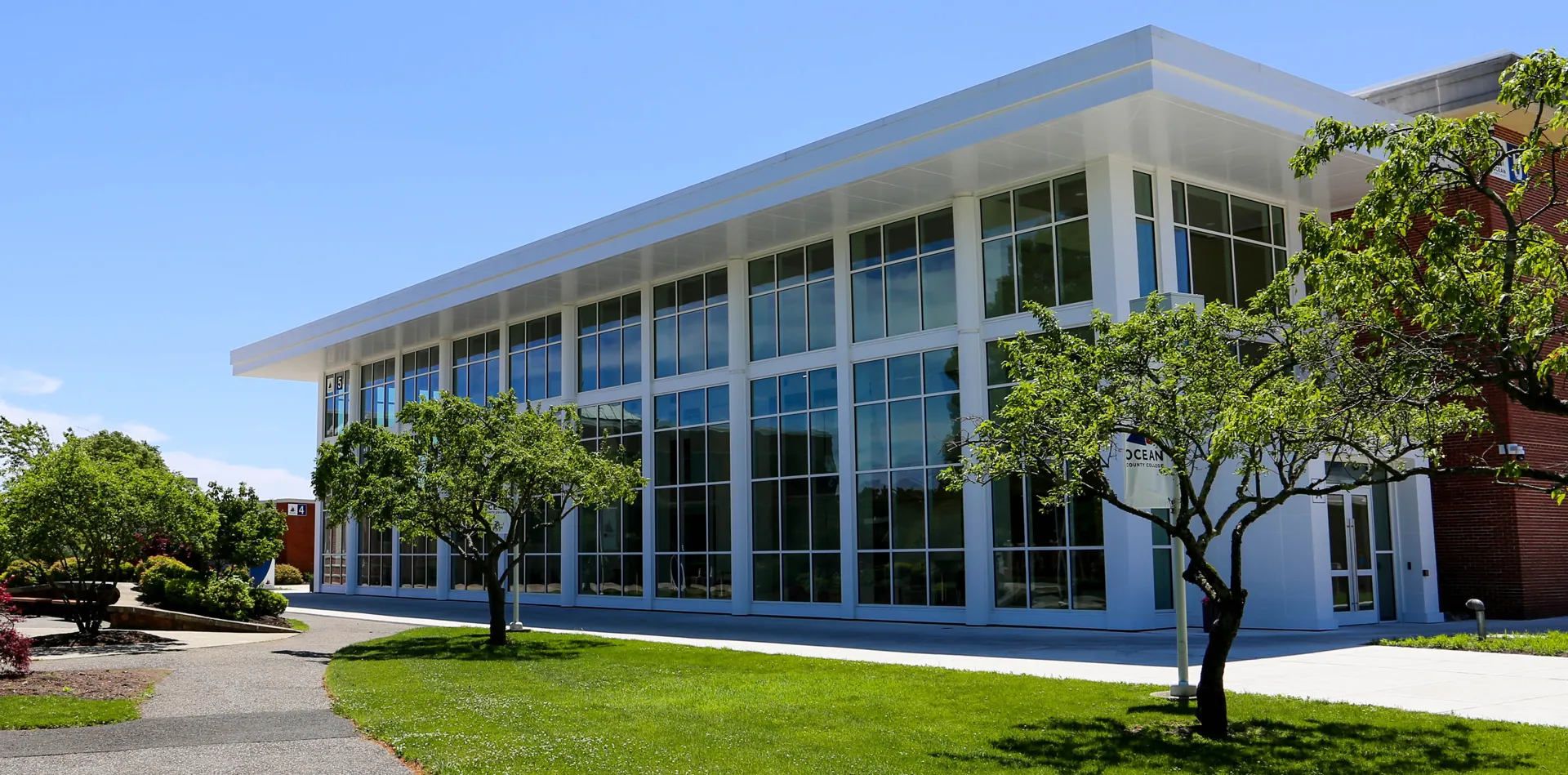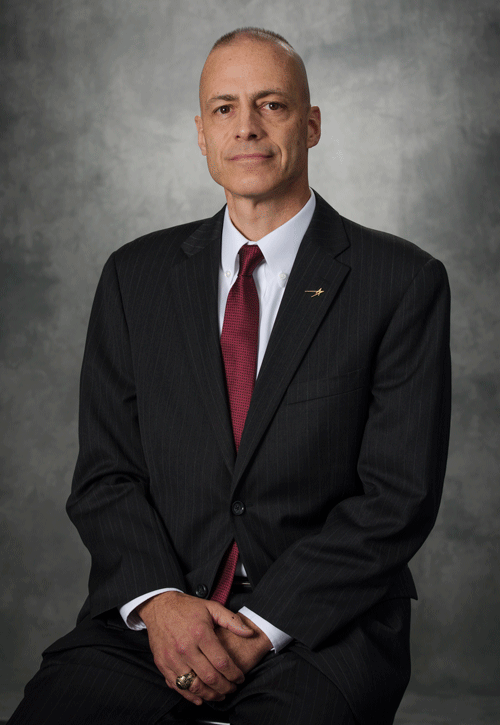Independence Day Holiday
Our administrative offices will reopen on Monday, July 7, 2025. More Details >>>


Changing the Course of His Life
Gregg E. Bauer’s OCC experience taught him a great many life lessons that he carried with him while building a successful career.
“I knew that, for the rest of my life, my success would be determined by how much effort I put into it — or didn’t. I realized that, and I brought my A-game from that day on. … How different would my life be if I hadn’t gone to OCC?”
Gregg Bauer’s ah-ha! moment was memorable in its simplicity and for changing the course of his life.
On the first day of his first class at Ocean County College in the fall of 1981, Bauer attended an Econ 101 lecture in the Planetarium. He mentions the pleasure he took in the simple fact that he was allowed to bring his coffee to class.
“High school had felt like jail to me,” says Bauer. “But college was the opposite. I was sitting there that day, listening to this very smart man talk about economics, and I realized, for the first time, that it was all on me.”
The self-described “not-great student” felt as if he was pushed through high school by teachers who just wanted him to graduate and go, but during his first class at OCC, he had this educational epiphany. “For whatever reason, I realized it was all me. No one was going to push me through anything in college. And I knew that, for the rest of my life, my success would be determined by how much effort I put into it — or didn’t,” he remembers. “I realized that and I brought my A-game from that day on.” He earned A’s in most classes at OCC and graduated as a Liberal Arts major with a 3.81 GPA.
Born and reared in Rochester, New York, Bauer moved to Toms River with his mother and older sister just before he began high school at Toms River North, shortly after his parents’ divorce. And soon after that, when his father passed away, his mom needed to find a job; she became a secretary at OCC and worked there for 25 years. As the child of an OCC employee, Bauer received the crucial tuition assistance that made attending college a reality for him instead of just a dream.
Bauer had already known about the College, because “it is part of the Toms River zeitgeist.” Bauer worked throughout high school and college at the Hess gas station on Hooper Avenue to pay for his books and incidentals. As a marginal student with no direction, he had felt untethered and says he just figured out what to do on his own after high school.
As a “typical young boy of the ’70s,” Bauer played football and had his sights set on joining the NFL, or becoming a cop, or joining the military. As an avid reader who was drawn to books about the military, over time, he grew deeply interested in military intelligence. That interest was reinforced by the nightly television news reports during the Vietnam War. He was fascinated by those broadcasts.
“Why are we there? What are we doing? What is the bigger global context? I always had a hunger to understand geopolitics,” he says. He satisfied his hunger by enrolling in Trenton State College (now The State College of New Jersey) in the political science program with an emphasis on public administration, which was focused on helping its graduates find careers in government.
“My career goals were being shaped then, but politics intrigued me, mainly because I didn’t understand it,” he says. “I was a good researcher and writer, so political science seemed to be a natural fit to satisfy my geopolitical curiosity and match my skills.” At that point, Bauer figured he would help run a political campaign and leverage that into an internship and a job on Capitol Hill.
Although that plan didn’t pan out, his natural expertise in writing, communication and business and his fascination with military intelligence encouraged Bauer to enroll in the master’s program at Georgetown University’s Walsh School of Foreign Service, where he earned his degree in National Security Studies. By then, he had already interned for New Jersey Governor Tom Kean as a writer, producing policy papers on the environment and lots of general correspondence. He also had worked for two years as an Intelligence Analyst for the New Jersey State Police in West Trenton. That job didn’t hold his interest and he yearned for more excitement, so he applied to the Aviation Officer Candidate School (AOCS) in Pensacola, Florida, was commissioned as an ensign and sent to serve on the USS Midway during the first Gulf War, from October 1990 to March 1991.
When Saddam Hussein invaded Kuwait, Bauer was attached to the helicopter squadron aboard the aircraft carrier, whose home port was Yokosuka, Japan, and whose responsibilities were Special Operations Forces support. The job was twofold: combat search and rescue (picking up downed airmen) and inserting Navy SEALS onto oil platforms, for example, to secure the platforms for Kuwait.
Bauer served on active duty from 1988-91 and spent most of the rest of his career in the Navy Reserves, retiring in 2008 with the rank of commander.
Enrolling at Georgetown felt like the next right step for him. “I was trading on my intel experience, and was in the Naval Reserves,” he says. “I also was in business as a defense contractor supporting sometimes classified programs, so I felt Georgetown’s program fit very nicely at that point. And it still does.”
Working Hard
Bauer’s time at OCC was a blur — his full class schedule and job filled any free time, leaving none for athletics or clubs. And he remembers it all as a great time in his life. “How different would my life be if I hadn’t gone to OCC?” he wonders. “I kept my nose to the grindstone, worked and studied, then transitioned to Trenton.”
He is grateful for his OCC degree in the liberal arts that gave him the opportunity to test a variety of subjects. Business was one of his favorite classes, and although he doesn’t remember the instructor’s name, the teacher’s mantra, “There is no free lunch in business,” stuck with Bauer. “He was an older gentleman, retired from a long and successful business career and he repeated that saying often,” he says. “And he was right. You have to work hard for what you get.”
That work ethic, illuminated and reinforced at Ocean County College, has served Bauer well. Now the Vice President of Lockheed Martin’s Undersea Warfare & Integration Programs market segment within the Rotary and Mission Systems business area, he leads the corporation’s $1.7 billion business that includes submarine, surface ship and surveillance sonar programs, submarine imaging and integration, maritime patrol mission system, unmanned undersea vehicle and torpedo and the Australian future submarine programs.
He also is the General Manager of Lockheed Martin’s Manassas Operations, which includes a 13-acre, seven-building complex in Northern Virginia housing 1,300 employees across multiple open and closed engineering, production, integration, test and operations spaces. Bauer currently serves as Deputy Chair of the National Defense Industrial Association’s Undersea Warfare Division Executive Board and is a member of the George Mason University SciTech Advisory Board.
And he credits OCC with helping him hone the drive to be No. 1 at whatever he does.
“That day [at OCC] shaped me for my entire career.”
Today, Bauer continues to read a lot — his answer to “What book are you reading?” — You Cannot Be Serious, by tennis great John McEnroe. When he’s not working, Bauer loves to run. He and his wife, Carolyn, run in the annual Army Ten-Miler race throughout northern Virginia and the streets of Washington, D.C.
She is a CPA who holds an MBA and recently started her dream job with the Navy as CFO for the nonprofit Navy and Marine Corps Relief Society. The couple lives in Maryland and has three children, each of whom is an engineer. “I am not a degreed engineer and neither is my wife, so go figure,” he says. Samantha, the eldest, is a software engineer in San Diego; Travis, a civil engineer, just earned his wings and is a naval flight officer; and the youngest, Mollie, is a sophomore majoring in Mechanical Engineering at the University of Virginia.
Editor’s Note: Shortly after this article was written, Lockheed Martin announced a reorganization that resulted in Bauer being promoted from vice president of the undersea warfare business to vice president and general manager of Lockheed’s C6ISR business. Said Bauer, “I am humbled by this opportunity, and I am grateful for the kick-start I received from OCC — without which, none of this is possible.”